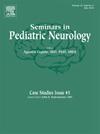The impact of undernutrition and overnutrition on early brain development
IF 2.1
4区 医学
Q2 CLINICAL NEUROLOGY
引用次数: 0
Abstract
In this review, we explore the effects of malnutrition on childhood neurodevelopment. Early brain development is highly sensitive to nutritional status. Both undernutrition and overnutrition can disrupt critical neurodevelopmental processes, affecting cognition, emotional regulation, and long-term mental health. Nutrient deficiencies, such as iron, iodine, folate, and vitamin B12, have been linked to impaired brain growth and function. Similarly, excessive caloric intake can also negatively impact brain development as it may contribute to neuroinflammation and altered neurocircuitry. The effects are most pronounced during prenatal life and early childhood, with lasting consequences on academic performance, behavior, and productivity. In addition to health-related outcomes, undernutrition and overnutrition can also have significant social and financial repercussions for individuals and their communities. This review synthesizes current insights on the relationship between nutrition and brain development, explores specific nutrient effects, and highlights the role of public health interventions. Addressing both undernutrition and overnutrition through early and targeted action is essential for optimizing neurodevelopment and reducing the long-term societal burden of cognitive and mental health disorders. Continuous monitoring of both existing and emerging nutritional deficiencies is necessary, particularly in marginalized communities and low- and middle-income regions, where the risk of undernutrition remains high.
营养不良和营养过剩对早期大脑发育的影响
在这篇综述中,我们探讨营养不良对儿童神经发育的影响。早期大脑发育对营养状况非常敏感。营养不良和营养过剩都会破坏关键的神经发育过程,影响认知、情绪调节和长期心理健康。营养缺乏,如铁、碘、叶酸和维生素B12,与大脑发育和功能受损有关。同样,过量的热量摄入也会对大脑发育产生负面影响,因为它可能会导致神经炎症和神经回路的改变。这种影响在产前和儿童早期最为明显,对学习成绩、行为和生产力都有持久的影响。除了与健康有关的后果外,营养不良和营养过剩还可能对个人及其社区产生重大的社会和经济影响。这篇综述综合了目前关于营养与大脑发育之间关系的见解,探讨了特定的营养效应,并强调了公共卫生干预的作用。通过早期和有针对性的行动解决营养不良和营养过剩问题,对于优化神经发育和减少认知和精神健康障碍的长期社会负担至关重要。有必要持续监测现有和新出现的营养缺乏症,特别是在营养不足风险仍然很高的边缘化社区和低收入和中等收入地区。
本文章由计算机程序翻译,如有差异,请以英文原文为准。
求助全文
约1分钟内获得全文
求助全文
来源期刊

Seminars in Pediatric Neurology
CLINICAL NEUROLOGY-PEDIATRICS
CiteScore
4.80
自引率
0.00%
发文量
38
审稿时长
84 days
期刊介绍:
Seminars in Pediatric Neurology is a topical journal that focuses on subjects of current importance in the field of pediatric neurology. The journal is devoted to making the status of such topics and the results of new investigations readily available to the practicing physician. Seminars in Pediatric Neurology is of special interest to pediatric neurologists, pediatric neuropathologists, behavioral pediatricians, and neurologists who treat all ages.
 求助内容:
求助内容: 应助结果提醒方式:
应助结果提醒方式:


